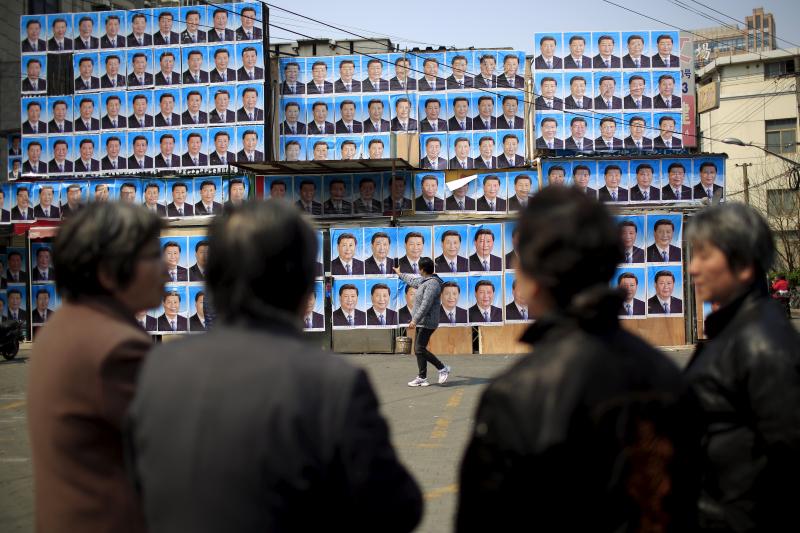PBS: Escaping Eritrea … [Read More...] about ካብ ውሽጢ ቤት ማእሰርታት ኤርትራ
The New Dictators
Why Personalism Rules

Strongmen are seemingly everywhere. Russian President Vladimir Putin is omnipresent; the media has obsessed over everything from his latest actions in Syria and Ukraine to his sudden and recurring reshuffling of his inner circle in the Kremlin. Meanwhile, Turkish President Recep Tayyip Erdogan’s political purge following a failed military coup has won sustained attention. And even in China, a system that has long emphasized collective leadership, the media have dubbed President Xi Jinping the “Chairman of Everything,” reflecting his accumulation of more power than any Chinese leader since Mao Zedong.
It is easy to get swept up in the colorful details of each case. But stepping back, it is clear that these examples paint a much more worrisome picture—highly personalized regimes are coming to the forefront of political systems across the globe. Beyond the best-known examples, leaders everywhere from Bangladesh to Ecuador, Hungary, and Poland seem to be showing a growing penchant toward the concentration of political power at the very top. But is there more to the story than just perception?

It turns out that there is. Data show that personalism is on the rise worldwide. And although the trend has been widespread, it has been most pronounced in authoritarian settings. Data show that personalist dictatorships—or those regimes where power is highly concentrated in the hands of a single individual—have increased notably since the end of the Cold War. In 1988, personalist regimes comprised 23 percent of all dictatorships. Today, 40 percent of all autocracies are ruled by strongmen.
It is easy to assume that all dictatorships fit the strongman mold. Vivid anecdotes of infamous and eccentric leaders from Libya’s Muammar al-Qaddafi to Zaire’s Joseph Mobutu reinforce this perception. But reality is more nuanced. Since the end of World War II, most dictatorships have not been run by strongmen, but by strong political parties, such as the Institutional Revolution Party (PRI) in Mexico, or military juntas, as in much of Latin America in the 1970s and 1980s. Since the end of the Cold War, however, authoritarian politics has evolved, and personalist dictatorships have steadily become the predominate form of authoritarianism.
This is cause for concern because the rise in personalism is creating a number of challenges to U.S. foreign interests. A robust body of political science research shows that personalist dictatorships tend to produce the worst outcomes of any type of political regime: they tend to produce the most risky and aggressive foreign policies; they are the most likely to invest in nuclear weapons; the most likely to fight wars against democracies; and the most likely to initiate interstate conflicts. As the adventurism of Iraq’s Saddam Hussein, Uganda’s Idi Amin, and North Korea’s Kim Jong-un suggests, a lack of accountability often translates into an ability to take risks that other dictatorial systems simply cannot afford.
Russia underscores the link between rising personalism and aggression. Although Putin’s actions in Crimea and Syria were designed to advance a number of key Russian goals, it is also likely that Putin’s lack of domestic constraints increased the level of risk he was willing to accept in pursuit of those goals. Putin’s tight control over the media ensures that the public receives only the official narrative of foreign events. Limited access to outside information makes it difficult for Russians to access unbiased accounts of the goings-on in the rest of the world and gauge Putin’s success in the foreign policy arena. Putin’s elimination of competing voices within his regime further ensures that he faces minimal accountability for his foreign policy actions.
Politics in China shows many of these same trends. Xi’s increasingly aggressive posture in the South China Sea has occurred alongside the rising personalization of the political system. If he further consolidates control and limits accountability—particularly over military and foreign policy bodies—research suggests that he, too, could feel free to further escalate his aggressive rhetoric and actions in the South China Sea.

Not only do personalist dictatorships pursue aggressive foreign policies—they are also often difficult and unpredictable partners. Research underscores that, thanks to limited constraints on decision-making, personalist leaders generally have the latitude to change their minds on a whim, producing volatile and erratic policies. Moreover, personalist leaders—think Putin, Bolivian President Evo Morales, and Venezuelan President Nicolás Maduro—are among those autocrats who are most suspicious of U.S. intentions and who see the creation of an external enemy as an effective means of boosting public support. Anti-U.S. rhetoric, therefore, is most pronounced in personalist settings.
Finally, personalist regimes are the most corrupt and the least likely to democratize. Strongman dictatorships, more so than any other type of government, depend on the distribution of financial incentives to maintain power. As such, these leaders are the most likely to squander foreign aid they receive. The Philippines’ Ferdinand Marcos and Mobutu, for example, each stole an estimated $5 billion while in power. Their propensity to dismantle institutions and sideline competent individuals out of fear of threats to their power also bodes poorly for democracy. Instead of transitioning to democracy, the collapse of personalist regimes tends to give way to new dictatorships (as in the Democratic Republic of Congo post-Mobutu) or failed states (as in Somalia since Siad Barre).
Rising global turmoil and insecurity—political forecasts suggest that the world is likely to become increasingly turbulent over the next 10 to 20 years, given increasing levels of violence, economic disparity, and polarization—indicate that the trend toward personalism is likely to persist. Instability could elicit a widespread backlash against the core democratic values of freedom of expression and individual empowerment if a greater share of citizens worldwide comes to see strong leaders as a better option than volatility and chaos. In fact, research suggests that as individual fears of societal change and external threats grow, so too does the preference for strong, decisive leaders who are willing to use force to maintain order.
Personalist rule is not a new phenomenon. If anything, it has been the norm for much of history, ranging from the pharaohs of Egypt to the monarchs of Europe. Although the past century had seen the spread of more collegial forms of dictatorship, personalism has come back with a vengeance since the end of the Cold War. That spells danger for U.S. and Western policymakers. There are no easy solutions to the problems of personalism. But gaining a better understanding of this growing trend and its implications for U.S. foreign policy seems both essential and overdue.
